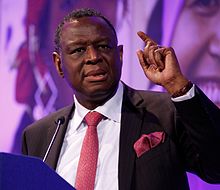Babatunde Osotimehin
| Babatunde Osotimehin | |
|---|---|

Osotimehin speaking at the London Summit on Family Planning in 2012
|
|
| Executive Director of UNFPA, the United Nations Population Fund | |
|
Assumed office 1 January 2011 |
|
| Preceded by | Thoraya Obaid |
| Federal Minister of Health | |
|
In office 17 December 2008 – 17 March 2010 |
|
| Preceded by | Adenike Grange |
| Succeeded by | C.O.Onyebuchi John |
| Personal details | |
| Born |
6 February 1949 Ogun State, Nigeria |
Babatunde Osotimehin (born 6 February 1949), a national of Nigeria, was appointed on 19 November 2010 as the new Executive Director of UNFPA, the United Nations Population Fund, for a four-year term. He was reappointed to this position on 21 August 2014 He assumed the position on 1 January 2011 and became the organisation's fourth Executive Director. He holds the rank of Under-Secretary-General of the United Nations. Previously, he was Nigeria's Minister of Health. He left this office in March 2010 when Acting President Goodluck Jonathan dissolved his cabinet.
Babatunde Osotimehin was born in February 1949 in Ogun State. He attended Igbobi College between 1966 and 1971. After his medical studies at University of Ibadan, he received a doctorate in medicine from the University of Birmingham, United Kingdom, in 1979. Prior to his appointment at UNFPA, the United Nations Population Fund, Dr. Osotimenhin served as the Minister of Health of Nigeria. Before that, Dr. Osotimehin was the Director-General of the Nigerian National Agency for the Control of AIDS, an agency that coordinates all HIV and AIDS work in a country with more than 150 million people. As chairman of the National Action Committee on AIDS (NACA) he oversaw the development of systems that, today, manage more than US$1billion. During his tenure as Project Manager for the World-Bank assisted HIV/AIDS Programme Development Project from 2002–2008, he achieved great success.
Dr. Ostotimehin's interests include youth and gender, within the context of reproductive health and rights. Young people will be his special focus at UNFPA. "We need to ensure that young people of both genders have equal participation, not only in reproductive rights and health but also within society and in the economy." In a 2005 article in the New York Times, he noted that nearly 58 percent of Nigerians with H.I.V. are female. Many girls in Nigeria are married off before they are physically or psychologically ready, when they are as young as 13 or 14. It is not acceptable for them to ask their partners to use a condom or to refrain from sex. Later that year, he said that the government had ordered an increase to 250,000 of the number of HIV-positive people on Nigeria's antiretroviral treatment program.
...
Wikipedia
